Crowie is still hungry at 39
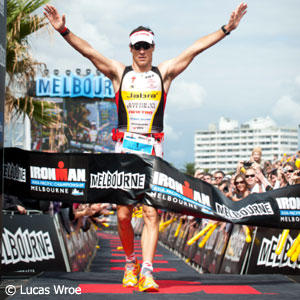
Craig Alexander has done more than enough in his career to make a triumphant walk into the sunset as one of the all-time greats of triathlon. In case you forgot some of his landmark wins in the wayback machine (7 years), let’s go over the glittering highlights one more time:
Winner of the $200,000 top prize at the Olympic distance 2005 Life Time Fitness Triathlon. Winner of the 2006 and 2011 Ironman 70.3 World Championship. Winner of the 2008, 2009 and 2011 Ironman World Championship. Holder of the Ironman World championship at Kona race record set by Luc van Lierde 15 years before. Oldest man (38) to win the Ironman World Championship in Kona, breaking the record set by Mark Allen in 1995. Not to forget his countless major half Ironman and Ironman 70.3 victories.
And yet, the man called Crowie is not even thinking of yielding to Father Time. At age 39, he stand atop the 2012 Kona Pro rankings, a landslide of points ahead of the best Ironman athletes on the planet. And early this season, he ticked off another box on the career bucket list – breaking 8 hours by winning the inaugural Ironman Melbourne against one of the toughest fields of the year.
Alexander spoke to Slowtwitch at his summer training base in Boulder, Colorado three weeks before the defense of his Ironman Hawaii crown.
Slowtwitch: How hard is it to come up with the level of motivation and hard work necessary to compete for an Ironman World title at age 39?
Craig Alexander: The desire to compete is still there. The will and motivation are still there. But it is getting harder with family and other career-related responsibilities. This year I did a book which is due to be released shortly. [As the Crow Flies: My Journey to Ironman World Champion] Once I agree to do a project, there is a lot of work and I feel obligated morally to make sure give it its due diligence. The start of this year was filled with that. Obviously I also have a lot of sponsors, a lot of obligations and I take them seriously. I am not the type of athlete who takes a sponsorship and then disappears. I feel I am an ambassador for my sponsors.
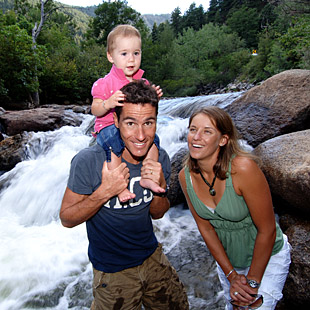
Slowtwitch: I can see from your book and whenever I see you with your children and your wife that your family is a high priority not only in your heart but with your time. How do you manage this and how does this affect your readiness?
Craig: Lucy and Austin are 7 and 3 years old and I want to spend more time with them. Particularly this time of year right before Las Vegas and Kona, I spend a lot of hours training. Racing is a big investment and after workouts I am really tired and it is hard to be the kind of dad you want to be. I’d say I do not have regret or have guilt feelings for the time I take training now that Lucy is seven and Austin is growing fast. But it is a big effort and it weighs on your thoughts. Lucy gets home schooled, but you wonder if you are doing the right thing by your child. Their schooling and how they are raised weighs on my mind. So far so good. Neri spends a lot of time with them and we are helped by great tutors.
ST: Your children learn from their parents. But what have you learned from your children?
Craig: You learn the finiteness of life. When you are young you think you will live forever. But because kids grow so quickly, you soon realize we are only here for a limited time. So by necessity you learn what is important. What is most important to Neri and I is to bring up our children well. The hope is that they will become great members of society and great people – and that they will be happy, healthy and contributing to society and be courteous.
ST: What is different from the early years in your career?
Craig: It is easy when you’re an athlete or a small business owner to be so focused doing things to advance your work you can forget the big picture — which is that the sun comes up every day and life is to love. It is great to have kids. The best thing that ever happened to me was to become a dad. Particularly when you are an athlete striving to race at a World Championship level, you naturally become very single minded and focused. But when kids come along, by necessity that opens your eyes to the life outside your sport.
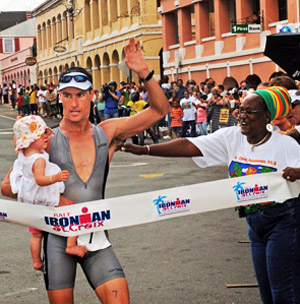
ST: How do you go about teaching Lucy lessons of humility when she sees you winning many of the biggest races in the world and receiving the cheers of the crowd?
Craig: Obviously Lucy sees her daddy win a lot of races. But the main thing she sees is how much hard work goes into it every day. I think it is a great, challenging sport – a lifestyle sport that is much the same for pros and amateurs. And it is very family oriented. I love it take the kids to races where they see lots of kids’ parents do what her father does — training hard to do their best. It is the nature of sport that most of the time you lose more than you win. But the goal is to do your best on every occasion. She is obviously very happy and excited when I win. But in Las Vegas this year I came second and I was very happy. I told her, ‘Sweetie I am very happy. I did the best I could. I trained very hard and I had a good race. But you win sometimes and sometimes not.’
ST: As she is an intelligent, curious child, what things does she say that surprise you?
Craig: She says things every day that jolt me. Sometimes she says things that make me realize she is not our little baby any more and I wonder where she heard that. Those surprises are one of the great things about parenthood. You realize that parenthood is an ever evolving process. When you think you’ve got a handle on it, you don’t. You have to be on your toes at all times. Lucy is at an age where she is developing her own personality and view on things and the world. It is interesting to see how her growing knowledge of the world affects her perception of Neri and me.
ST: Does having children make you a better triathlete?
Craig: They make you a better person. I am not as selfish as I used to be when I was younger. Better athlete? I think I am in lot of respects a better athlete as a reflection of the person you are. When you are older, you can figure things out and streamline what is needed to get the job done. But regardless of any potential effect on myself as an athlete, I would not trade anything for the time you spend with your kids. That is gold.
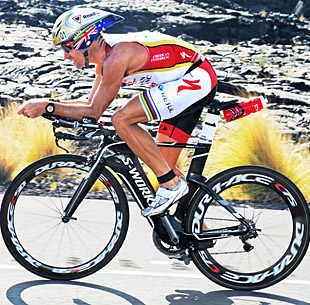
ST: Is there any difference in your triathlon performance this year?
Craig: Not a lot. I ended up in physically in great shape last year and I am in great shape this year. Obviously I pride myself on consistency. If you look at my race times this year, they are similar to last year. In particular my finish time at the Ironman 70.3 World Championship this year [3:55:36]] was very similar to my time last year (3:54:48, 48 seconds better than his 2012 time].
Craig: In Las Vegas, the course was similar but conditions were a bit different. This year you finished second, 1:01 behind Sebastian Kienle. Why?
Craig: There was virtually no wind so the bike was a touch quicker, but that made the run hotter, harder and a bit slower. But there was not a lot of difference in my time. I credit how well Sebastian Kienle raced and, at the end of the day, he was the best athlete on the course. The results are a fair indication of the race.
ST: Well, this was the second year of the new Crowie who became an alpha cyclist – not someone waiting for the run to begin. Why didn’t you go with Kienle?
Craig: It was the second running race in Vegas and there was a bit more depth in the men’s field. When you have several legit contenders it became a bit tactical. If you have a front group of 6-8 guys with great runners including a few great short course guys like Greg Bennett and Bevan Docherty, you are wary of their ability. Thus you are reluctant to pull the trigger on the bike when you realize what damage they can do on the run. And you realize the fact that they are not just runners, they are great all around triathletes. Greg Bennett showed it in Hy-Vee where he won last year and was third this year the week before Las Vegas. And Bevan Docherty was 4th or 5th at Hy-Vee, not far back. So you know all those top five guys at Hy-Vee are obviously in form. All those great bikers and lethal runners made me reluctant to pull the trigger.
ST: So why didn’t you pull the trigger to stay with Kienle? Why let Kienle go?
Craig: I would not say we let him go. He is a phenomenal bike rider. Make no mistake, when a rider of that caliber is on his best form, he makes you more reluctant to ride at 100 percent. Then there was also Tim O’Donnell and Andy Potts, who are two of the best 70.3 triathletes in the world. Andy Potts wins 3-4 of those races a year without fail against top fields and so does Tim O’Donnell. None of us let Sebastian go. He just went.
ST: Were you simply so worried about the deep talented field that your attention was diverted?
Craig: With the depth of the field and the dynamic of racing, all those top competitors make you reluctant to go all in on the bike. I knew very well that Sebastian is a very good runner – I follow his results. Certainly on my part I did not think I could give him a minute and half or two off the bike. He earned it and won comfortably at the end.
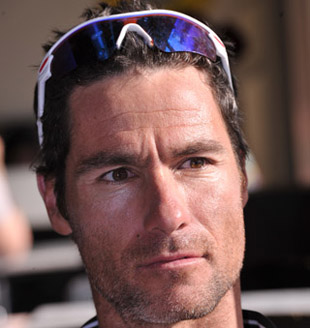
ST: Do you suppose that you got an unintended break by getting sick and injured last year and that left you fresh for two world championship performances Las Vegas and Kona? Do you suppose being healthy all this year may have ironically worn you down a bit more this time around?
Craig: It’s a good point, a relevant point. You certainly can’t train and recover as I did when I was younger. But you don’t need to. Last year I was operating with more base miles to cope with the virus and the broken rib – obstacles which proved to be not insurmountable. They were a speed bump you might say. But once I was healthy I had experts helping me to get back on track. This year I was not sick, but I set up a limited race schedule – Ironman Melbourne and Eagleman 70.3 [which he won] were my only two early season races. And I’ve had a very focused and limited late season schedule which was right for someone my age with a growing family.
ST: How have your growing roster of sponsor obligations affected your readiness?
Craig: I can’t travel as much as I did when I was young. The fact is I can’t travel as well as I did before. In the evolution of my career, I have a lot of sponsors. With success you get great sponsors and with that there is an investment of time. You do not get to train as much – but you don’t need to. The sponsor commitment is a good thing – it prevents me at my age from doing too much. It’s a built-in damage control. And, with my experience, I know how to nurse myself through a season. One of the things I pride myself is to consistently race at a high level with a good season plan and good balance in my life.
ST: How much have you changed in your training and preparation this year? And how much have you retained from last year’s changes?
Craig: I've been changing a lot things this year. The things I changed last year were huge benefits. I still feel the improvements made on my bike last year and I still run well. This year I’ve had a bit more focus on the bike riding in training. In particular, my focus has been on being in a more aggressive position on the bike – both small position adjustments and aerodynamic adjustments. This year I’ve worn an aero helmet. A lot of things I began to change last year have come to bear fruit
ST: What else have you changed?
Craig: I am a lot more vigilant with my diet as I get older. I’ve adopted a lot of things like recovery proteins and supplements. Five years ago, I never bothered with them. Now I certainly devote attention to getting protein and the right amino acids.
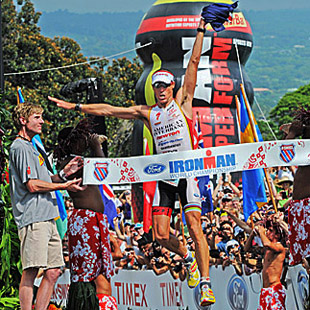
ST: What rivals are coming on strong now for Kona? Can Andreas Raelert come back at full strength after his early season thigh troubles and 4th place at Frankfurt?
Craig: Andy Raelert has finished 3rd, 2nd, and 3rd his last three hits out. You cannot discount him. He seems to be coming into form. In the half Ironmans he is always great and has won Walchsee and Kraichgau. You cannot forget that he also ripped out a great performance in a very quick time at Challenge Roth in 2011 – an Ironman distance world record time [7:41:33].
ST: Some thought Macca was retired but he seems to be back.
Craig: Macca is back in the mix. You never know quite what you get with Chris. One thing we know is if he brings to the table what he did in 2010, watch out. His performance then was one of the best ever on the Big Island. By what I’m told by people around him he is highly motivated and focused. He had been planning a comeback for 2 years — since his 2010 race. And this year he will be in great shape
ST: Who else?
Craig: Marino Vanhoenacker is another guy who has not yet had his best race in the Big Island [and he won Frankfurt this year over Kienle by 6 minutes] . I think Andy Potts will be not just top 10. I think this year he has more focus. His performance in Vegas was very good [5th, 2:19 behind Kienle, 1:18 behind Alexander]. People who tend to race a lot tend to lose fitness near the end of the year. But Andy had a great race in Lake Placid [1st in near record 8:25:00]. He recovered well and could continue his form on an upward trajectory. Plus he has not done the number of races this year as in the past. I think he has the goods. And I think he can access them because he has had a lot of focus on Kona this year.
ST: Who might be the best kept secrets this year?
Craig: I mention few guys who are known but still coming into their own at Ironman. Tim O’Donnell is up and coming in Ironman. He has done a handful of them, and has the potential to win Kona for sure — maybe not this year but certainly in years to come. [O’Donnell was 4th in Las Vegas 70.3 Worlds, won San Juan and Galveston 70.3s, 2nd at Ironman Coeur d’Alene, 2nd at Lake Stevens 70.3]. Luke McKenzie is also on an upward trend. He can swim and bike into the thick of the race and is capable of running 2:50 on the back of that [2nd 2012 Ironman Cairns 70.3, 9th 2011 Ironman Hawaii]. Pete Jacobs has been fighting illness and injury this year [2nd 2011 Ironman Hawaii]. But I think he has recovered and I think he’s a guy to focus on Kona and certainly not a dark horse.
ST: Is Macca more of a threat with all the speed work he did in his Olympic quest?
Craig: Nothing he did this year makes him more of a threat. In his best form he’s a threat. The Olympic thing was something he wanted to do, an itch he wanted to scratch. I will say in his mind what I hear is he was always coming back to Kona. This year had a long term plan to be in great shape for Kona. Especially after not racing Kona for one year, and skipping the mental and physical volume required in training for Kona. Obviously at Challenge Cairns last year [1st 8:15:56 with a 2:51 marathon while training for the Olympics and this June at Ironman Cairns he was 10th in 9:05] he proved he was in tune and he validated his entry.
ST: Is it the physical rest, or the mental break from Ironman that will make Macca most dangerous?
Craig: As usual with Chris, he is very good at summing up the situation and preparing for what it entails. He wants to be a contender. He had not done [serious] Ironman [training] for a year because he needed a mental and physical break from it. So he will be sharp. I think it was a smart move to step back. When you have done a decade of Ironman racing which is so mentally and physically intensive, a break is good.
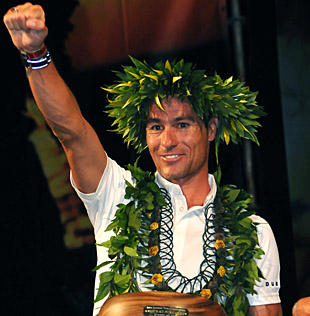
ST: You are very diplomatic and never smack talk your competitors in public. But are there certain people you enjoy racing more than others?
Craig: I enjoy racing all the best guys. I do not take any more pleasure in beating one guy more than another. It is a challenge to win and racing over a course of years you get good luck and bad luck and it all comes out in the wash.
ST: Were you looking forward to racing Lance Armstrong? Are you disappointed he won’t be on the start line?
Craig: I think it added interest when Lance announced he intended to race Kona. I noticed when Lance is racing, when it was apparent that Lance and Chris [McCormack] were going to race, I wanted to step into the breach. Last year when I heard the possibility that Lance would race Kona, I decided to have another crack at it. I thought it would be special to be a part of it. Obviously he will not be there now. still, I am glad I decided to do another Kona.
ST: What do you think of the situation of Lance Armstrong’s banishment by USADA?
Craig: My opinion there is no place for drugs in sport – period. I do not mind the hard line the WTC took at all. They are trying to sport clean. That said, there have been murder trials that have gone from start to finish quicker than the Lance Armstrong case. On the other hand, I feel that if USADA is trying to crucify someone’s reputation let’s see the evidence. I am sick of innuendo and rumor. I want to see what they have. There are two sides to the story, and I think the public is entitled to see every frame of reference.
ST: What does this say about your attitude on doping in sport?
Craig: I also have a tough stance on doping in sport and all kinds of cheating. Do it the right way or you should be drummed out of the sport. If clean athletes loses a paycheck and a victory because of someone who had a great race because they took drugs or cut the course, the cheater should be convicted and kept out of sport. On the other side of the coin, if you are trying to ruin a man’s reputation, I want to see something. I do not want to hear talk. I do not want to hear rumor. I want to know what led USADA to believe categorically that Lance is a cheater.
ST: Guilty or not, isn’t due process a critical element of the equation?
Craig: As much a stakeholder in sport as I am, so are all the amateurs and sponsors and media. I do like to see due process and this case has all the hallmarks of a witch hunt — until USADA shows what they have. My final word is — I have zero tolerance of cheating.


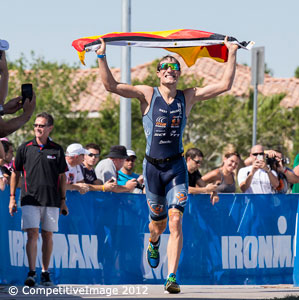
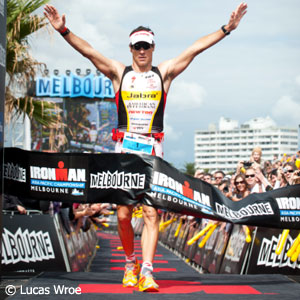
Start the discussion at slowtwitch.northend.network